Items filtered by date: July 2024
Causes of Cracked Heels
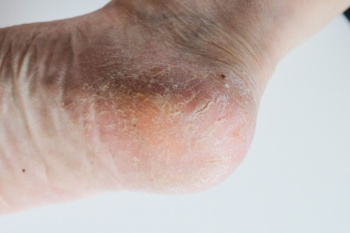
Cracked heels can result from various factors, including dietary deficiencies. Insufficient intake of essential vitamins like A, C, and E, as well as minerals such as zinc and iron, can contribute to dry, flaky skin prone to cracking. A diet lacking in omega-3 fatty acids may also impair skin hydration and elasticity, causing heel fissures. Additionally, dehydration plays a critical role, as inadequate water intake reduces skin moisture, making heels more susceptible to cracking. Other causes include prolonged standing or walking barefoot, which increases pressure on the heels, and wearing open-back shoes that fail to support the heel adequately. Cracked heels can be painful and unsightly. If you have developed this condition, it is suggested that you consult a podiatrist who can provide effective treatment solutions, which often includes prescribed medication.
Cracked heels are unsightly and can cause further damage to your shoes and feet. If you have any concerns, contact Jennifer M. Kern, DPM from South Carolina. Our doctor can provide the care you need to keep you pain-free and on your feet.
Cracked Heels
Cracked heels appear unappealing and can make it harder for you walk around in sandals. Aside from looking unpleasant, cracked heels can also tear stockings, socks, and wear out your shoes. There are several methods to help restore a cracked heel and prevent further damage.
How Do You Get Them?
Dry skin is the number one culprit in creating cracked heels. Many athletes, walkers, joggers, and even swimmers suffer from cracked heels. Age and skin oil production play a role to getting cracked heels as well.
Promote Healing
Over the counter medicines can help, especially for those that need instant relief or who suffer from chronic dry feet.
Wear Socks – Wearing socks with medicated creams helps lock in moisture.
Moisturizers – Applying both day and night will help alleviate dryness which causes cracking.
Pumice Stones – These exfoliate and remove dead skin, which allows for smoother moisturizer application and better absorption into the skin.
Change in Diet
Eating healthy with a well-balanced diet will give the skin a fresh and radiant look. Your body responds to the kinds of food you ingest. Omega-3 fatty acids and zinc supplements can also revitalize skin tissue.
Most importantly, seek professional help if unsure how to proceed in treating cracked heels. A podiatrist will help you with any questions or information needed.
If you have any questions, please feel free to contact our office located in West Columbia, SC . We offer the newest diagnostic and treatment technologies for all your foot care needs.
Types of Neuropathy and Its Impact on Feet
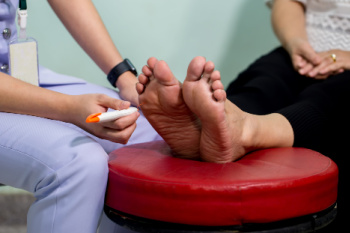
Peripheral neuropathy is a condition caused by damage to the peripheral nerves, often resulting in numbness, tingling, burning sensations, and pain in the extremities. There are several types of peripheral neuropathy, each with its own set of causes and symptoms. Regardless of the underlying cause, peripheral neuropathy can have a significant impact on the feet, leading to decreased sensation, balance issues, and an increased risk of foot injuries and ulcers. Diabetic neuropathy is one of the most common types and is caused by nerve damage from prolonged exposure to high blood sugar levels in people with diabetes. Other types include compressive neuropathy, which occurs when nerves are compressed or pinched, and toxic neuropathy, which can result from exposure to certain medications, chemicals, or toxins. Proper foot care, including regular inspections, supportive footwear, and maintaining good blood sugar levels for diabetes, is essential for managing symptoms and preventing complications associated with peripheral neuropathy. If your feet are affected with any of the above symptoms, it is strongly suggested that you meet with a podiatrist who can offer you effective methods to manage the type of neuropathy you have.
Neuropathy
Neuropathy can be a potentially serious condition, especially if it is left undiagnosed. If you have any concerns that you may be experiencing nerve loss in your feet, consult with Jennifer M. Kern, DPM from South Carolina. Our doctor will assess your condition and provide you with quality foot and ankle treatment for neuropathy.
What Is Neuropathy?
Neuropathy is a condition that leads to damage to the nerves in the body. Peripheral neuropathy, or neuropathy that affects your peripheral nervous system, usually occurs in the feet. Neuropathy can be triggered by a number of different causes. Such causes include diabetes, infections, cancers, disorders, and toxic substances.
Symptoms of Neuropathy Include:
- Numbness
- Sensation loss
- Prickling and tingling sensations
- Throbbing, freezing, burning pains
- Muscle weakness
Those with diabetes are at serious risk due to being unable to feel an ulcer on their feet. Diabetics usually also suffer from poor blood circulation. This can lead to the wound not healing, infections occurring, and the limb may have to be amputated.
Treatment
To treat neuropathy in the foot, podiatrists will first diagnose the cause of the neuropathy. Figuring out the underlying cause of the neuropathy will allow the podiatrist to prescribe the best treatment, whether it be caused by diabetes, toxic substance exposure, infection, etc. If the nerve has not died, then it’s possible that sensation may be able to return to the foot.
Pain medication may be issued for pain. Electrical nerve stimulation can be used to stimulate nerves. If the neuropathy is caused from pressure on the nerves, then surgery may be necessary.
If you have any questions, please feel free to contact our office located in West Columbia, SC . We offer the newest diagnostic and treatment technologies for all your foot care needs.
Symptoms of Diabetic Foot Problems
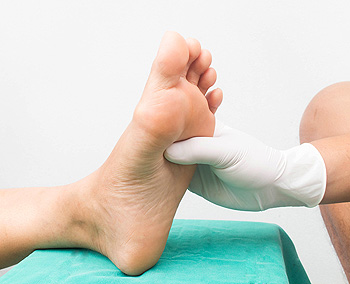
Diabetes poses significant risks to foot health due to its impact on nerves, circulation, and the immune system. Peripheral neuropathy, a common complication, reduces sensation in the feet, making it difficult to detect injuries or pressure points that can lead to foot ulcers. Additionally, impaired blood flow and weakened immunity slow down healing processes, increasing the likelihood of infections that can quickly become serious. Symptoms of diabetic foot problems to watch for include persistent pain, redness, swelling, warmth, and drainage from wounds. These are potential signs of underlying issues that require immediate attention. Regular foot inspections, wearing proper footwear, and regularly scheduled appointments with a podiatrist are essential for preventing diabetic foot problems from progressing. Early intervention not only improves outcomes but also reduces the risk of complications, such as gangrene and amputation. If you have diabetes, learning how to care for your feet and recognizing the early signs of trouble are essential steps in managing your overall health. It is suggested that you add a podiatrist to your team of healthcare professionals for treating diabetes-related foot problems.
Diabetic foot care is important in preventing foot ailments such as ulcers. If you are suffering from diabetes or have any other concerns about your feet, contact Jennifer M. Kern, DPM from South Carolina. Our doctor can provide the care you need to keep you pain-free and on your feet.
Diabetic Foot Care
Diabetes affects millions of people every year. The condition can damage blood vessels in many parts of the body, especially the feet. Because of this, taking care of your feet is essential if you have diabetes, and having a podiatrist help monitor your foot health is highly recommended.
The Importance of Caring for Your Feet
- Routinely inspect your feet for bruises or sores.
- Wear socks that fit your feet comfortably.
- Wear comfortable shoes that provide adequate support.
Patients with diabetes should have their doctor monitor their blood levels, as blood sugar levels play such a huge role in diabetic care. Monitoring these levels on a regular basis is highly advised.
It is always best to inform your healthcare professional of any concerns you may have regarding your feet, especially for diabetic patients. Early treatment and routine foot examinations are keys to maintaining proper health, especially because severe complications can arise if proper treatment is not applied.
If you have any questions please feel free to contact our office located in West Columbia, SC . We offer the newest diagnostic and treatment technologies for all your foot and ankle needs.
Orthotics Can Help With Arch Support
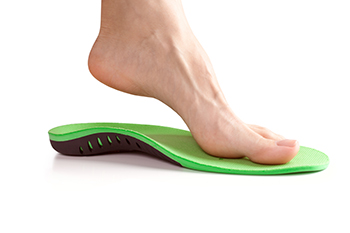
Proper arch support is essential for maintaining foot health and preventing discomfort. While over-the-counter arch supports are available at many sports and shoe stores, custom orthotics prescribed by a podiatrist can offer personalized relief for those suffering from arch pain. These medical devices are designed and created specifically for your foot. Customized orthotics for arch support help to rebuild the foot’s natural strength by providing targeted support, thereby preventing further injury and aiding in the repair of existing damage. The rigidity of these supports ensures that the arches remain elevated while allowing some flexibility for natural movement. In severe cases, continuous support methods like taping can be beneficial, providing consistent arch stability even when barefoot. Consulting with a podiatrist is vital for ensuring the proper fit and function of your orthotic device, as improperly fitted supports can cause additional harm. If you are experiencing arch pain, it is suggested that you make an appointment with a podiatrist for an exam and treatment.
If you are having discomfort in your feet and would like to try orthotics, contact Jennifer M. Kern, DPM from South Carolina. Our doctor can provide the care you need to keep you pain-free and on your feet.
What Are Orthotics?
Orthotics are inserts you can place into your shoes to help with a variety of foot problems such as flat feet or foot pain. Orthotics provide relief and comfort for minor foot and heel pain but can’t correct serious biomechanical problems in your feet.
Over-the-Counter Inserts
Orthotics come in a wide variety of over-the-counter inserts that are used to treat foot pain, heel pain, and minor problems. For example, arch supports can be inserted into your shoes to help correct overarched or flat feet, while gel insoles are often used because they provide comfort and relief from foot and heel pain by alleviating pressure.
Prescription Orthotics
If over-the-counter inserts don’t work for you or if you have a more severe foot concern, it is possible to have your podiatrist prescribe custom orthotics. These high-quality inserts are designed to treat problems such as abnormal motion, plantar fasciitis, and severe forms of heel pain. They can even be used to help patients suffering from diabetes by treating foot ulcers and painful calluses and are usually molded to your feet individually, which allows them to provide full support and comfort.
If you are experiencing minor to severe foot or heel pain, it’s recommended to speak with your podiatrist about the possibilities of using orthotics. A podiatrist can determine which type of orthotic is right for you and allow you to take the first steps towards being pain-free.
If you have any questions please contact our office located in West Columbia, SC . We offer the newest diagnostic and treatment technologies for all your foot and ankle needs.
Are Bunions Affecting Your Everyday Life?
Causes of Chronic Pain in the Big Toe
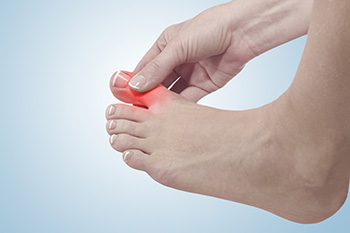
Pain in the big toe can arise from a variety of sources affecting its joints, muscles, tendons, and nerves. Chronic big toe pain ranges from dull aches to sharp, tingling sensations, similar to pins and needles. Other symptoms associated with big toe pain include numbness, burning sensations, difficulty moving the toe, and visible swelling. Among the common causes of big toe pain are arthritis, bunions, and calluses, all of which often worsen by natural wear and tear. Injuries like strains and sprains can also contribute to toe pain. In addition, inflammatory conditions, such as gout or bursitis, and structural problems, like hammer toe or nerve compression, can further complicate matters. Ignoring persistent toe pain can lead to serious complications including chronic discomfort, disability, and nerve damage. Seeking prompt medical attention from a podiatrist is important. This foot doctor can accurately diagnose the underlying cause of chronic big toe pain and suggest effective treatment strategies. If pain in the big toe worsens, it is suggested that you schedule an appointment with a podiatrist for an exam and treatment.
Toe pain can disrupt your daily activities. If you have any concerns, contact Jennifer M. Kern, DPM of South Carolina. Our doctor can provide the care you need to keep you pain-free and on your feet.
What Causes Toe Pain?
Most severe toe pain is caused due to a sports injury, trauma from dropping something heavy on the toe, or bumping into something rigid. Other problems can develop over time for various reasons.
Toe pain can be caused by one or more ailments. The most common include:
- Trauma
- Sports injury
- Wearing shoes that are too tight
- Arthritis
- Gout
- Corns and calluses
- Hammertoe
- Bunions
- Blisters
- Ingrown toenails
- Sprains
- Fractures (broken bones)
- Dislocations
When to See a Podiatrist
- Severe pain
- Persistent pain that lasts more than a week
- Signs of infection
- Continued swelling
- Pain that prevents walking
Diagnosis
In many cases the cause of toe pain is obvious, but in others, a podiatrist may want to use more advanced methods to determine the problem. These can range from simple visual inspections and sensation tests to X-rays and MRI scans. Prior medical history, family medical history, and any recent physical traumatic events will all be taken into consideration for a proper diagnosis.
Treatment
Treatments for toe pain and injuries vary and may include shoe inserts, padding, taping, medicines, injections, and in some cases, surgery. If you believe that you have broken a toe, please see a podiatrist as soon as possible.
If you have any questions please feel free to contact our office located in West Columbia, SC . We offer the newest diagnostic tools and technology to treat your foot and ankle needs.




